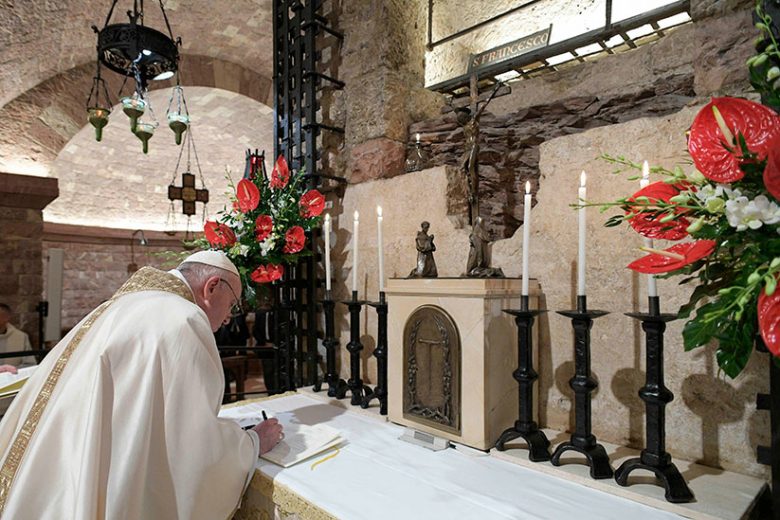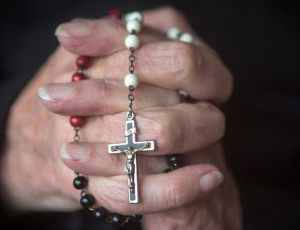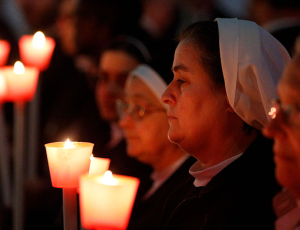A message from Bishop David M. O’Connell, C.M.
Our Holy Father Pope Francis has published his third encyclical letter entitled “Fratelli tutti”(literally “brothers all”), signing it in Assisi on October 3, at the tomb of his patron, St. Francis of Assisi, on the 794th anniversary of his death. Despite the controversy that has arisen over its title as sexist, the Holy See has responded that Pope Francis was using a direct quote from the writings of St. Francis which he chose not to change. That decision was in no way intended to exclude or offend women, to whom the encyclical is also addressed, since such terminology, as traditionally used, includes both women and men. That inclusivity is clearly evident and represented throughout the text.
The encyclical is subtitled “on fraternity and social friendship” and has been written with the stated purpose not to
… claim to offer a complete teaching on fraternal love, but rather to consider its universal scope, its openness to every man and woman. I offer this social Encyclical as a modest contribution to continued reflection, in the hope that in the face of present-day attempts to eliminate or ignore others, we may prove capable of responding with a new vision of fraternity and social friendship that will not remain at the level of words. Although I have written it from the Christian convictions that inspire and sustain me, I have sought to make this reflection an invitation to dialogue among all people of good will (FT, 6).
The Holy Father continued,
As I was writing this letter, the COVID-19 pandemic unexpectedly erupted, exposing our false securities. Aside from the different ways that various countries responded to the crisis, their inability to work together became quite evident. For all our hyper-connectivity, we witnessed a fragmentation that made it more difficult to resolve problems that affect us all. Anyone who thinks that the only lesson to be learned was the need to improve what we were already doing, or to refine existing systems and regulations, is denying reality (FT, 7).
It is my desire that, in this our time, by acknowledging the dignity of each human person, we can contribute to the rebirth of a universal aspiration to fraternity. Fraternity between all men and women. “Here we have a splendid secret that shows us how to dream and to turn our life into a wonderful adventure. No one can face life in isolation… We need a community that supports and helps us, in which we can help one another to keep looking ahead. How important it is to dream together… By ourselves, we risk seeing mirages, things that are not there. Dreams, on the other hand, are built together”. Let us dream, then, as a single human family, as fellow travelers sharing the same flesh, as children of the same earth which is our common home, each of us bringing the richness of his or her beliefs and convictions, each of us with his or her own voice, brothers and sisters all (FT, 8).
As with all encyclicals and papal documents, “Fratelli tutti” invites our serious consideration of what it actually says and the manner in which it does so, rather than what critics will claim it does not say. It is ecumenical in text and tone, which will bother some readers but, after all, it admits at the onset to presenting a “new vision” of human relationality drawing upon what currently is or seems to be while aspiring to the rebirth of a new universal appreciation of human fraternity and social friendship in our world based upon mutual respect for the “dignity of each human person.”
Composed of an introduction, eight chapters and a concluding appeal, the chapter headings are, in themselves, instructive and successfully focus attention on what is to follow in the text.
Prior to its publication, the Holy See provided the bishops throughout the world with an excellent overview of the encyclical as well as other resources to help prepare for its accurate presentation. I do not recall as comprehensive an effort accompanying the release of previous papal documents which underscores the importance the Holy Father attaches to it. These materials are helpful and deeply appreciated. Recognizing that no commentary can adequately substitute for reading the encyclical itself – which I heartily encourage – I would like to share the Holy See’s overview rather than “reinvent the wheel,” so to speak.
Shadows over the closed world (Ch. 1) are spreading everywhere, leaving injured people by the roadside, cast out and discarded. The shadows plunge humanity into confusion, loneliness, and desolation.
When we come upon an injured stranger on the road (Ch. 2), we can assume one of two attitudes: we can pass by or we can stop to help. The type of person we are and the type of political, social or religious group we belong to will be defined by whether we include or exclude the injured stranger. God is universal love, and as long as we are part of that love and share in it, we are called to universal fraternity, which is openness to all. There are no “others,” no “them,” there is only “us”.
We want, with God and in God, an open world (Ch. 3), a world without walls, without borders, without people rejected, without strangers.
To achieve this world, we must have an open heart (Ch. 4). We need to experience social friendship, seek what is morally good, and practice a social ethic because we know we are part of a universal fraternity. We are called to solidarity, encounter, and gratuitousness.
To create an open world with an open heart, it is necessary to engage in politics, and a better kind of politics (Ch. 5) is essential. Politics for the common and universal good. Politics that is “popular” because it is for and with the people. It is politics with social charity that seeks human dignity. The politics of men and women who practice political love by integrating the economy with the social and cultural fabric into a consistent and life-giving human project.
Knowing how to dialogue is the way to open the world and build social friendship (Ch. 6) which manifests an open heart and provides the basis for a better politics. Dialogue seeks and respects the truth. Dialogue gives rise to the culture of encounter, which becomes a way of life, a passionate desire. Whoever dialogues is generous, recognizing and respecting the other.
But it is not enough just to engage in encounter. We have to face the reality of the injuries of past mis-encounters, and so we have to establish and walk the paths of re-encounter (Ch. 7).
We need to heal the wounds, which requires seeking and offering forgiveness. To forgive is not to forget. We need to be daring and start from the truth—the recognition of historical truth—which is the inseparable companion of justice and mercy. All this is indispensable for advancing towards peace. Conflict is inevitable on the road to peace, but violence is inadmissible. That is why war is a recourse that must be rejected, and the death penalty a practice that must be eliminated. The different religions of the world recognize human beings as God’s creatures. As creatures, we are in a relationship of fraternity.
The religions are called to the service of fraternity in the world (Ch. 8). In dialogue and with hearts open to the world, we can establish social friendship and fraternity. In our openness to the Father of all, we recognize our universal condition as brothers and sisters. For Christians, the wellspring of human dignity and fraternity is in the Gospel of Jesus Christ, and that is what inspires our actions and commitments. This path of fraternity also has a Mother called Mary.
Faced with those injured by the shadows of a closed world and still lying by the roadside, we are invited by Pope Francis to make our own the world’s desire for fraternity, starting with the recognition that we are “Fratelli tutti,” brothers and sisters all.
Pope Francis’ latest encyclical builds upon the entirety of his papal magisterium, calling for a sense of common belonging to God’s human family on earth, our “common home,” and a “necessary affection” between and among people, regardless of any differences that may exist.
At a time in our history when the COVID pandemic has affected millions of people around the world resulting in “social distancing” from one another; when disregard for human life from conception to natural death is not only commonplace but legal; when economic, political and racial tensions abound, creating further divisions among us, the Holy Father’s message is necessary, compelling and welcome.
Such “fraternity and social friendship,” the central themes of the papal document here, are a Gospel imperative – the “joy of the Gospel” – and the will of God for the people he created and made his own.
For citations and to read the full text, click HERE.




